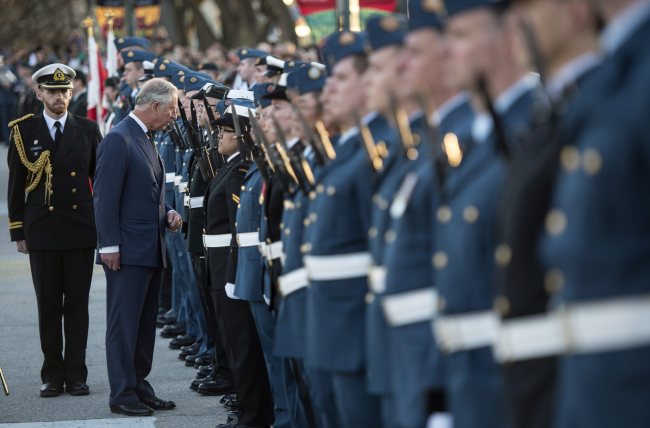LONDON (AFP) ― Russia lodged a furious protest with Britain on Thursday after Prince Charles reportedly compared President Vladimir Putin to Adolf Hitler, with Moscow saying the “outrageous” comments were unworthy of a future king.
The Russian deputy ambassador held talks with a middle-ranking British official at the Foreign Office in London following the reported remarks by the heir to the throne during a trip to Canada.
Charles made the apparently unguarded comment, which drew a parallel between Hitler and Putin’s actions in Ukraine, during a private conversation with a Polish-born woman on a trip to a museum.
 |
| Prince Charles inspects an honor guard during a farewell ceremony in front of the Manitoba Legislature in Winnipeg, Canada, Wednesday. (AP-Yonhap) |
“If these words were really said, then undoubtedly they are not worthy of a future British monarch,” foreign ministry spokesman Alexander Lukashevich said in Moscow.
“We have requested an official explanation from British authorities over the statements.”
The Russian embassy in London issued a separate statement saying deputy ambassador Alexander Kramarenko would raise the “outrageous remarks made by Prince Charles in Canada” in his meeting.
But after the talks, the Foreign Office said a British official had told Kramarenko that it “could not be expected to comment upon reports of private conversations.”
Instead, the British official ― Sian MacLeod, a diplomat with responsibility for Eastern Europe and Central Asia ― used the meeting to urge Russia to avoid disrupting presidential elections due to be held in Ukraine this weekend.
“The U.K. urges Russia to step back from actions that cause instability and conflict, and lead to international condemnation,” a spokeswoman said, adding that “continued instability in Ukraine is in no-one’s long-term interests.”
The Prince’s office, Clarence House, declined to comment on the Russian reaction when contacted by AFP on Thursday.
But it said on Wednesday that Charles “would not seek to make a public political statement during a private conversation.”
The comments by Charles to the Polish woman, who had fled the Nazis as a child, were reported by the Daily Mail on Wednesday.
“I had finished showing him the exhibit and talked with him about my own family background and how I came to Canada,” 78-year-old Marienne Ferguson told the newspaper.
“The prince then said: ’And now Putin is doing just about the same as Hitler.’”
Russia’s Lukashevich slammed Western media for using Charles’s reported words in what he said was a propaganda campaign targeting Russia.
“We consider it is unacceptable, disgusting and low that Western media are using members of the British royal family to unroll a propaganda campaign against Russia on a contentious international issue like the situation in Ukraine,” he said.
Russia and Britain’s positions “differ widely and that is obvious, we see that from the statements of British politicians,” Lukashevich said.
“To discuss these topics, we have absolutely legal two-way channels and that does not call for pronouncing judgements in a broad public forum.”
The row threatens to cast a shadow over commemorations in France to mark the 70th anniversary of D-Day on June 6, which both Charles and Putin are due to attend, although royal aides said no formal meeting was scheduled.
The leaders of Britain’s three main political parties ― Conservative Prime Minister David Cameron, Liberal Democrat Deputy Prime Minister Nick Clegg and Labour leader Ed Miliband ― all backed Charles’s right to express private views despite his role as future head of state.
Miliband even said that Charles “has got a point about President Putin’s actions.”
But the comments will not improve ties between London and Moscow, already under renewed strain because of the crisis in Ukraine.
Britain and Russia’s post-Cold War relations were plunged into deep freeze following the 2006 murder of Alexander Litvinenko, a Russian dissident, in London. He was poisoned by radioactive polonium.
Relations began to improve in 2011, but the crisis over Ukraine has led to fresh tensions as the United States and the EU imposed sanctions on Russia for its intervention in the former Soviet state.

